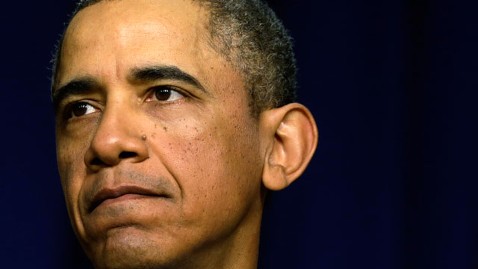President Obama Faces 'Cliff Fatigue' in Latest Budget Fight

(Charles Dharapak/AP Photo)
ANALYSIS By RICK KLEIN
Hundreds of thousands of jobs are at risk. Delays await at airports. Padlocks are ready at national parks.
The nation will suffer greater risk of wildfires, workplace deaths, and even surprise weather events, if government predictions are to be believed. Our entire military readiness and superiority are at risk.
What if nobody cares?
President Obama sure does. He's making the case, aggressively and comprehensively, that the automatic spending cuts set to go into effect at the end of the month will have a devastating impact, both on the economy and on essential government services.
"They will slow our economy. They will eliminate good jobs. They will leave many families who are already stretched to the limit scrambling to figure out what to do," the president said Saturday in his weekly radio address.
But there are few signs to suggest the public is listening. A poll out late last week found that barely one in four Americans said they'd heard much about the automatic spending cuts - known unhelpfully for public-comprehension purposes as "sequestration" - and four in 10 said they were comfortable with the cuts going into effect.
"Here's yet another deadline, and everyone's telling us everything will be destroyed if we go past it," said Michael Dimock, director of the Pew Research Center for the People and the Press, which conducted the poll. "It's very hard to get the same sense of urgency for a third time in a row, just two months after the last one."
Call it cliff fatigue. After a series of dramatic confrontations with congressional Republicans, an American electorate that has little trust in Washington - and that's seeing a soaring stock market, plus a recovering housing market - looks to be tuning out the latest round of fiscal fighting, at least for now.
That's troublesome news for Obama, and not just for the recurring fights over spending and deficits. As his second-term agenda gets cranking with Congress' return this week, the president needs to convince the public not just on the merits of his priorities but also on the urgency.
This may be the only time in his presidency where heavy legislative lifts are realistic. That period is starting with a rough stretch: The spending cuts Obama once guaranteed would never take place now almost definitely will.
The fight is displaying Washington at its worst - all accusations and finger-pointing, no real attempts at problem-solving. Both sides have plans, but the president is spending far more energy explaining why the sequester is the Republicans' fault, and how bad the consequences of those cuts will be, than he is trying to negotiate something that would stop it.
"It really is sad. The president's stock in trade is political games, and this is another political game he's playing," Rep. Tom Price, R-Ga., vice chairman of the House Budget Committee, told ABC News. "It results in greater cynicism on the part of the public, and none of the things he's saying are true. And people recognize this - it's 2-and-a-half cents on every dollar."
Price said the president is exaggerating the impact of cuts that amount to less than 2.5 percent of federal spending - an estimated $85 billion this year, out of a federal budget in the neighborhood of $3.5 trillion.
Moreover, Price said, the public will wind up blaming the president - notwithstanding polling that suggests the opposite for now. While many Republicans are on record preferring alternatives to the across-the-board cuts, they also argue that the president could mitigate their impact if he so chose.
"People know that if bad things occur, it's because the president wants them to occur," Price said. "The president is the president. He's in charge of the government. He has the authority right now to make sure bad things don't happen."
The White House disputes that such flexibility exists, given the blunt mechanisms in a law that was designed to never be implemented because it was so draconian.
"Only Congress can avoid this self-inflicted wound to our economy and middle class families," White House communications director Jennifer Palmieri wrote in an official blog posting last week.
Lawmakers may wind up explicitly granting the administration flexibility in distributing the cuts as part of a compromise that would only be passed after they go into effect. Beyond that, however, one side will have to give to avoid the once-unthinkable from being reality.
In the meantime, the president will continue to make the case that the sequester is Republicans' doing. He'll be at a shipyard in Newport News, Va., on Tuesday, to highlight the particular impact on defense programs.
The president needs the public to care deeply about budget cuts. If the sequester doesn't register in the national consciousness, airport lines will be nothing compared to the wait for Republicans to join the president at a negotiating table again.